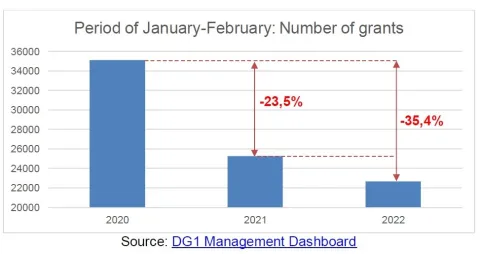SUEPO: Industrial actions ‘striking success’
March 30, 2022
The trade union SUEPO has claimed the strike it called for during the meeting of the Administrative Council on 22 March 2022 was a ‘striking success’.
According to a statement it sent to its members two days after the strike, 1.514 employees representing 24,45% of all staff participated in the strike, including 28,63% of staff in The Hague, 20% of staff in Munich, 46,94% of staff in Berlin, and 35,71% of staff in Vienna. It is the highest result of an industrial action since 2016 and even better than the strike of 15 December 2020. It is a clear signal to Mr Campinos that there is room for improvement in terms of social peace.”
The SUEPO also wrote that “strike registration was made difficult and remains unreliable. The registration tool showed an error message already on Friday which led many colleagues to simply discard it and only send an email to their line manager. (…) Some colleagues who managed to register (...) Friday with the tool, found out on Monday that their registration had disappeared. The HR Department confirmed that only the registrations entered via the tool were taken into account for counting the participation. (…) When putting the figures into perspective, even based on these unreliable and incomplete data, we count that at least 40% of non-managerial available staff went on strike.”

The strike was preceded on 17 March by a letter of EPO president Antonio Campinos, in which he invited SUEPO to meet members of his team. The SUEPO stated no progress could be reported from this meeting, however.
A new source of conflict at the EPO may be the start of a ‘professional mobility’ project called for by the EPO management. It received support from the Administrative Council in the 22 March meeting. According to the Central Staff Committee the “orientation paper on professional mobility bears the risk of introducing a decentralisation of the EPO and thus constitutes a fundamental reform of the EPO, incompatible with the mission of the Office”. The CSC “considers that a conference of ministers of the Contracting States under Article 4a EPC is overdue and urges the Heads of Delegation to inform their respective Ministries, if they wish to engage into this ‘professional mobility’ project.”
You may also like















Attentive Observer
The dismantling of the EPO by the actual president of the EPO continues unabated. For a start, he intends to push his teleworking scheme at any cost, although it is manifestly against the Centralisation protocol, even in its amended form. The document on ‘professional mobility’ (CA19/12 and CA 19/12 Corr. 1) was to be submitted for information to the latest AC on 23.03.2022. If was certainly also part of the discussions at the “Board of the Administrative Council (B28)” which is actually the decision instance. In general, what is decided at a B28 meeting is normally rubber stamped at the following meeting of the AC. According to an open letter to the members of AC, the Central Staff Committee drew the attention to its members that under the pretext to “support to deliver high-quality patents” (sic) the President intends to use Seconded National Experts (SNEs) to work in the patent granting process, in particular within divisions without formally being part of those divisions. Such a way of working of examining divisions is certainly not compatible with the EPC. Here again, only the teleworking scheme pushed by the actual president would enable those SNE to contribute to examining divisions of the EPO, whilst they are still sitting in their national offices. The Central Staff Committee suggested to hold a conference of ministers of the Contracting States under Article 4a EPC. In view of the diligence of his predecessor and of the present incumbent to convene such a conference, it is doubtful that such a conference will ever been held. One thing is however abundantly clear: the tail is till wagging the dog and the AC has completely given up its role of controlling the actions of the president. One wonders what could well be the hidden agenda of the last two tenants of the 10th floor. Could it be dismantling the EPO? At least the present tenant, although called in order to restore peace at the EPO, has done everything in order to increase the conflicts between staff and management. By reducing the salaries, reducing all other advantages or allowances, on the basis of a very shoddy financial study, everything is made to render a job less attractive at the EPO. It might well be that in the end it could be a good solution to second to the EPO national examiners to actually do the job of examiners. It is to be hoped that examiners will be able to sustain the pressure from management, which in the last years was always very prompt in threatening sanctions which can end up rather quickly with sanctions up to dismissal for incompetence if the target is not achieved. Legal means to this effect have been created.
Attentive Observer
Dear Concerned Observer, As far as quality of work is concerned, one has just to look at the decisions published by the BA. The number of patents maintained in amended form or even revoked is steadily increasing. Although oppositions are not evenly distributed over all technical areas, some seeing hardly any, but if one extrapolates the 5% of opposed patents to the rest of the granted patents, the number of patents in force which are not really valid must be extremely high. It is only if patents are used in infringement proceedings or if a declaration of non-infringement is thought, that the validity of the patents is considered in detail. It would be interesting to have the figure of the number of patents nullified or amended in national proceedings. The EPO does probably have the figure, but for obvious reasons it will not be published. The problem is that industry, and especially the big one, is happy with the situation. As long as the quality of EPO patents is somehow better than that of US patents, it will be satisfied. It enough to threaten competitors. As long as the number of patents opposed or subject to national litigation remains at the present level, nothing will probably change. There is no doubt that the quality of the work delivered by the EPO was much higher in the past, but as long as the users are satisfied with the output of the EPO, why bother? In this respect, what will be happening at the UPC, which is primarily conceived for the big industry, is symptomatic. Why is it that the basic fee for an action in nullity is nearly double of that for infringement? This is not a coincidence. With an opposition, the quality of a patent can be tested relatively early. If one has to wait a national procedure, or before the UPC, the latency time is much longer. In any case, the examiner in charge has in the meantime achieved his target and the EPO and the national offices have cashed fees, so that everybody is pleased. It is only if the industry, large or small, wakes up and realises that it is spending money which could as well be thrown out of the window that the situation may change. Professional organisations, like epi, could do something about it as well, but the danger here is that they could well saw the branch on which they are sitting. Lawyers are also happy charging fees. At the end of the day, as long as the cow can be milked, why change something? I would thus claim that the notion of “public service” is grossly misused. It is as public as the British “public schools” are actually public. It might all sound cynical, but in this day and age, paying attention to the rule of law is not a priority for many. Here again see what is happening at the UPC.